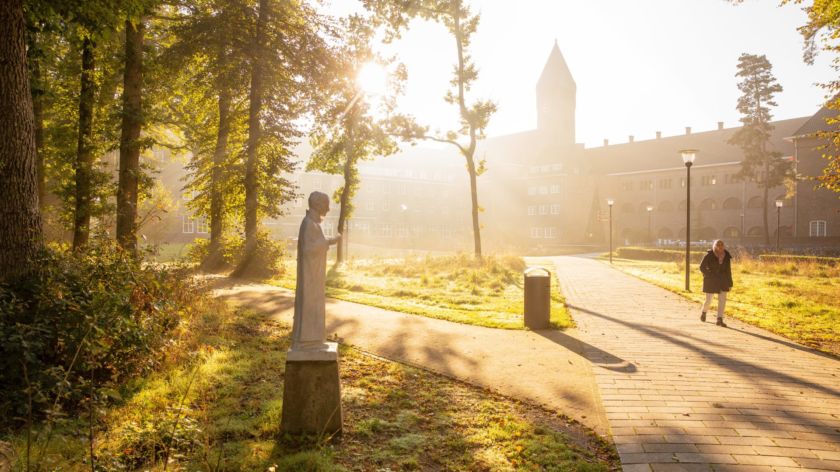‘100 years of Radboud University: time to rethink its identity and explore new opportunities’
-
 Berchmanianum. Foto: Dick van Aalst
Berchmanianum. Foto: Dick van Aalst
Radboud University is approaching a very special anniversary in 2023 and this provokes reflective questions in the minds of staff, students and alumni: Where do we stand in the academic landscape of today? Where is Radboud University headed? According to Jonas Kool, the centenary offers an opportunity to rethink the way Radboud University identifies and how they present themselves to the outside world.
Radboud University, named after the Catholic saint Radboud of Utrecht, saw life during the Catholic emancipation movement in the early 20th century. Back then, the Dutch Catholics had to suffer the consequences of discrimination, hatred and oppression in the country in which they were born and raised. They were, for instance, not supposed to study at the then existing universities. This emancipation movement of the modern Catholic reached a milestone in 1923. In that year, on the 17th of October, they fought their way into society by laying the foundation for the university where 25.000 students walk around campus nearly a century later.
End of an era
The Catholic roots of Radboud University and its valiant story of emancipation should never be forgotten, they should in fact be celebrated. However, I would argue that our identity has changed severely over the course of a century, Radboud University is not the same as it was in 1923. Its Catholic identity eroded over the years and symbolically ceased to exist in November 2020, when the Bishops’ Conference of the Netherlands decided to withdraw the Catholic status of the university. A true end of an era and even though the news came as a shock to a handful of people, it does reflect the sentiment among students.
According to a survey conducted by Vox in November 2021, 68 per cent of the students did not want the university to retain its Catholic status and 70 per cent regarded the withdrawal of the Catholic status as no loss at all. In that case, the university’s motto, which translates to ‘Happily in the name of God’, is outdated and should be reconsidered. But as I said earlier: its Catholic roots should not be forgotten.
Open dialogue
Rethinking our identity is a matter of how far you can go without neglecting the background of the university. For instance, I think that the motto should be changed, whereas I believe the name and emblem should remain as is. The reasoning here is that the name and emblem are visual assets that carry some type of brand value. In my opinion, those are also merely subtle hints towards the Catholic background. In contrast, the motto is rather explicit and makes only a slighter contribution to the public image of the university. As I see it, the identity that this motto communicates to the public does not mirror the real Radboud University.
Then recently, on the 11th of March, I received a university-wide e-mail about dialogue sessions in Huize Heyendaal, about the identity of Radboud University. These sessions are being organized at the request of the Executive Board to gather insight into the various perspectives of all people associated with the University. I support the dialogue on this particular matter to a large extent, and I encourage you to think about the Radboud University’s identity and participate in one of these sessions.
In my opinion however, this identity project of the Executive Board should be much broader and should not be limited to dialogue. I see opportunity to not only research what it means to study here, but also to set up a dedicated team to scientifically research what we consider our core values and strengths. In addition to the question of what the present looks like, the identity project should also be focused on the future. As any institution, the Radboud University should have a long-term vision on where they are headed. An important question is: What makes the Radboud University so distinct from other educational institutions? How does it stand out?
Academic landscape
Radboud University already stands out in various ways in the academic landscape I mentioned previously. First of all, it is a broad-based university, it operates in all the nooks and crannies of science with its faculties in alfa, beta and social sciences. The Radboud University enjoyed a second place, just half a point behind the first place, in the Keuzegids ranking for the best broad-based university of the Netherlands in 2021.
Another key characteristic in Nijmegen is interdisciplinarity, which is also closely related to the broad-based nature of the Radboud University. Take for example the interdisciplinary continuing education programmes of Radboud Academy, the many research projects shared between faculties and the interdisciplinary Honours Programme Building Bridges.
The third distinctive feature is its sustainability agenda. Radboud University is at the frontline of sustainability with the Radboud Green Office, committed research projects, environmental Master specializations and the mandatory sustainability Bachelor courses. These initiatives are unmatched by our Dutch peers and hold intrinsic value.
Momentum
I believe that if the university were to align its communication strategy with its key characteristics, it could achieve an even better status as an educational institution. They already have the right people to carry out this type of research. Terms such as ’strengths’, ‘core values’ and ‘key characteristics’ are used very often in certain parts of the Nijmegen School of Management, at which I am a student myself. I think that the initial quest of identity should be a building block for its strategic choices and the blossoming of its international persona. The upcoming anniversary built up the required momentum for rethinking the key characteristics of the Radboud University and exploring the new opportunities that the next century could bring.
Jonas Kool studies Business Economics at Radboud University. More information about the dialogue sessions, which started today, can be found here.




